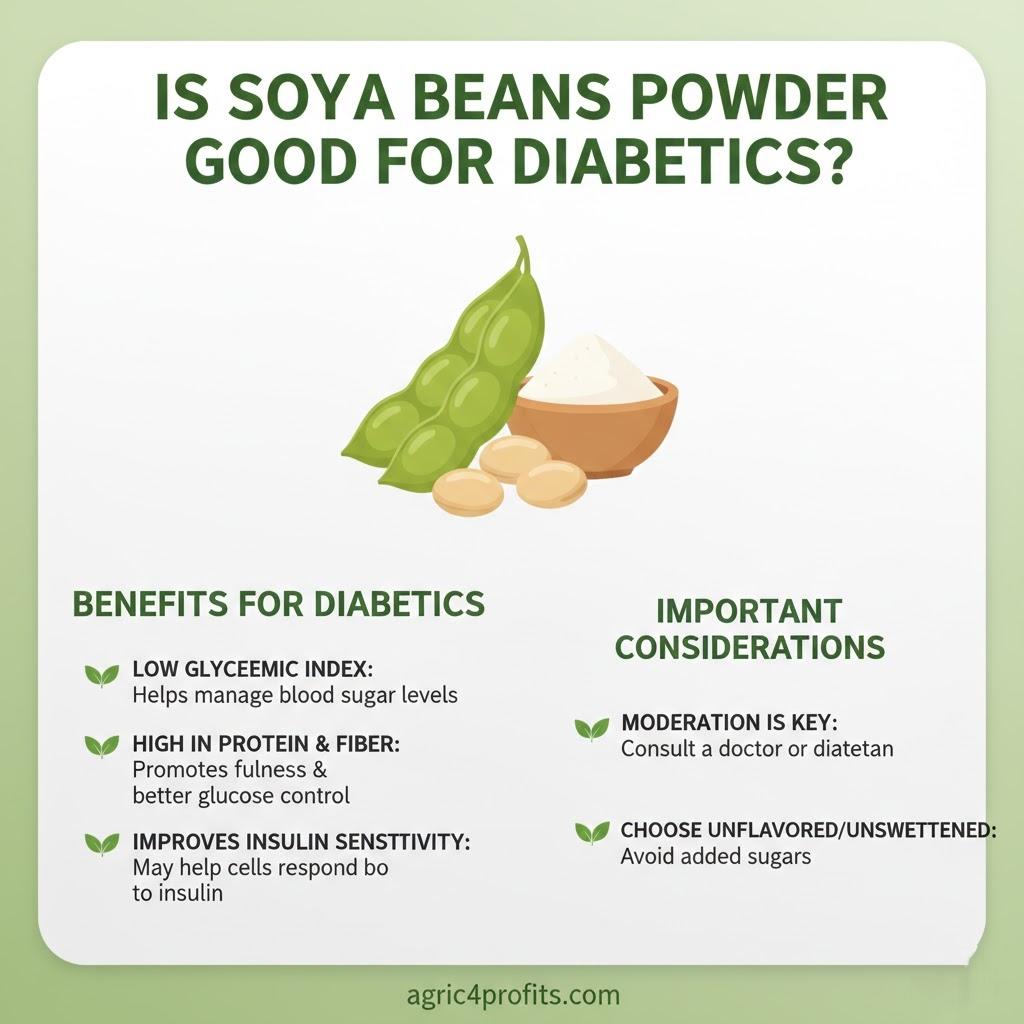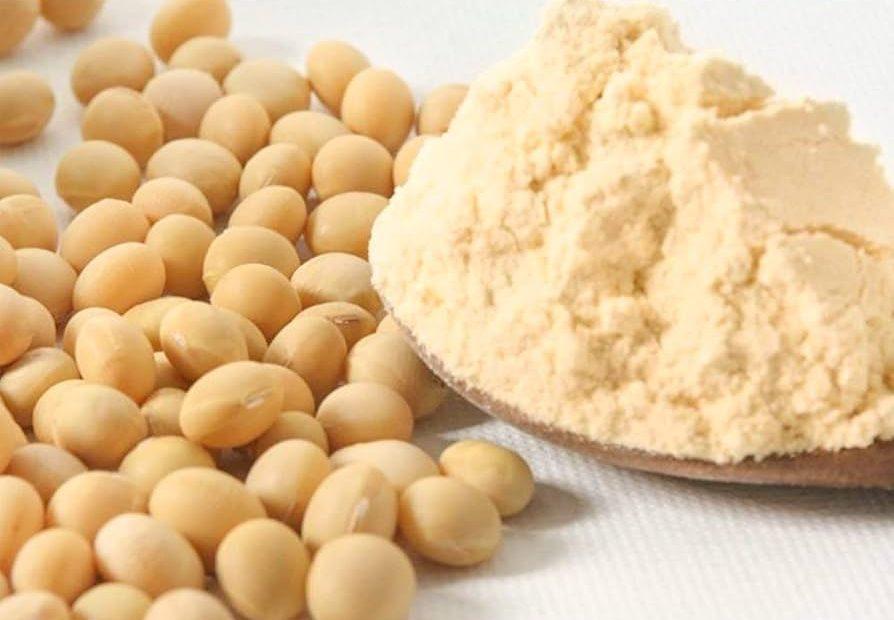Soya beans powder, derived from ground soybeans, offers notable potential benefits for individuals managing diabetes due to its nutritional profile that supports blood sugar control. As diabetes prevalence rises globally, incorporating low-glycemic, high-fiber, and protein-rich foods like soya beans powder can aid in stabilizing glucose levels and enhancing overall health.
Soya beans provide high-quality plant-based protein (complete with essential amino acids), substantial dietary fiber, healthy fats (including omega-3 and omega-6), vitamins (B vitamins), and minerals (calcium, iron, magnesium, potassium). The fiber slows carbohydrate absorption, preventing rapid blood sugar spikes, while promoting satiety for better weight management—a key factor in improving insulin sensitivity.
Soya beans powder ranks low on the glycemic index (typically 15-20), leading to gradual glucose release, stable energy, and reduced risk of complications. Isoflavones (phytoestrogens) act as antioxidants, may enhance insulin sensitivity, reduce inflammation, and support heart health—vital for diabetics prone to cardiovascular issues.
Versatile and neutral in flavor, soya beans powder integrates easily into smoothies, baked goods, soups, sauces, and more, boosting nutrition without major taste changes.
While promising, use in moderation within a balanced diet; consult a healthcare provider or dietitian for personalized advice, especially regarding allergies, hormone concerns, or medication interactions.
Understanding Diabetes and Its Dietary Needs

1. Diabetes Overview: Chronic condition impairing glucose processing, causing elevated blood sugar and risks like heart disease, nerve damage, and kidney issues if unmanaged.
2. Dietary Needs: Emphasize complex carbs, high fiber, lean proteins, healthy fats; limit sugars and refined carbs for stable glucose.
3. Portion Control: Monitor servings and carbs via labels and measurements.
4. Regular Meal Timing: Consistent eating prevents spikes/dips and supports energy.
5. Importance of Fiber: Slows sugar absorption, aids digestion, and improves control.
Nutritional Profile of Soya Beans Powder
1. Protein Content: ~36-40g per 100g, supports muscle health and satiety.
2. Healthy Fats: Polyunsaturated (omega-3/6) for heart benefits.
3. Carbohydrates: Moderate with high fiber for digestion and glucose control.
4. Vitamins and Minerals: B vitamins (energy), calcium, iron, magnesium, potassium.
5. Isoflavones: Antioxidant phytoestrogens with potential metabolic advantages.
Glycemic Index of Soya Beans Powder
1. Low Glycemic Index: Around 15-20, minimal blood sugar impact.
2. Slow Digestion: Gradual absorption for steady glucose.
3. Improved Satiety: Aids fullness and weight control.
4. Stable Energy Levels: Prevents crashes throughout the day.
5. Dietary Inclusion: Supports overall management and complication reduction.
Read Also: Causes of Egg Production Reduction in Poultry Farms and Ways to prevent them
Benefits of Soya Beans Powder for Blood Sugar Control
1. Blood Sugar Regulation: Fiber/protein stabilize levels, reduce spikes.
2. Insulin Sensitivity Improvement: Enhances glucose utilization.
3. Weight Management: High protein/low GI supports healthy weight.
4. Heart Health Support: Lowers cholesterol via fats/isoflavones.
5. Nutritional Versatility: Easy addition to meals for sustained benefits.
How Soya Beans Powder Affects Insulin Sensitivity
1. Improved Insulin Sensitivity: Protein/fiber aid effective glucose use.
2. Isoflavones Impact: Modulate metabolism, reduce inflammation.
3. Weight Management Connection: Satiety counters insulin resistance.
4. Balanced Blood Sugar Levels: Promotes stability.
5. Research Support: Studies link soy to better insulin response in type 2 diabetes.
Comparing Soya Beans Powder with Other Protein Sources
1. Soya Beans vs. Animal Proteins: Comparable protein, lower saturated fat/cholesterol.
2. Nutrient Density: Adds fiber/vitamins/minerals often missing in meats.
3. Digestibility: May suit some better (e.g., lactose-intolerant).
4. Allergen Considerations: Soy allergy risk; alternatives vary.
5. Environmental Impact: More sustainable than animal sources.
Incorporating Soya Beans Powder into a Diabetic Diet
1. Smoothies and Shakes: Boost protein with low-sugar ingredients.
2. Baking Recipes: Substitute in muffins/pancakes for nutrition.
3. Soups and Stews: Stir in for protein without taste change.
4. Salad Dressings: Blend for creamy, nutrient-rich options.
5. Portion Control: Manage servings to balance calories.
Potential Risks of Soya Beans Powder for Diabetics
1. Allergic Reactions: Possible soy allergy symptoms.
2. Phytoestrogens Concerns: Estrogen-like effects; mixed research.
3. Interaction with Medications: May affect some diabetes drugs.
4. Caloric Density: Overuse risks weight gain.
5. Digestive Issues: High fiber may cause bloating/gas initially.
Read Also: Best Type of Poultry to Raise for Commercial Production and their Time of Maturity
Recipes Using Soya Beans Powder for Diabetics

1. Soya Beans Powder Smoothie: Blend with unsweetened almond milk, spinach, small banana, ice.
2. Soya Beans Pancakes: Mix with whole wheat flour, baking powder, eggs, water; top with berries.
3. Soya Beans Soup: Add to vegetable broth with chopped veggies.
4. Soya Beans Energy Balls: Combine with oats, nut butter, chia seeds, minimal sweetener.
5. Soya Beans Flour Bread: Partial substitute in bread recipes.
Expert Opinions on Soya Beans Powder for Diabetics
1. Nutritional Benefits: Praised for protein/fiber/isoflavones aiding control.
2. Versatility: Easy integration without flavor issues.
3. Plant-Based Protein Source: Supports heart/diabetes management.
4. Research Support: Links to better glycemic/insulin outcomes.
5. Personalized Recommendations: Consult dietitians for tailored plans.
Studies on Soya Beans Powder and Diabetes Management
1. Glycemic Control Research: Improves control in type 2 diabetes.
2. Insulin Sensitivity Findings: Isoflavones enhance response.
3. Weight Management Studies: Aids via satiety/protein.
4. Comparative Studies: Soy often equals or outperforms animal proteins.
5. Long-term Benefits: Sustained metabolic improvements.
Summary of Is Soya Beans Powder Good For Diabetics?

| Section | Key Points |
|---|---|
| Introduction | High protein/fiber, low GI, isoflavones; slows carb absorption, improves insulin sensitivity, aids weight/heart health; versatile addition. |
| Diabetes Dietary Needs | Focus on fiber, lean protein, portion/timing control; limit refined carbs. |
| Nutritional Profile | ~36-40g protein/100g; healthy fats, moderate carbs with fiber, vitamins/minerals, isoflavones. |
| Glycemic Index | Low (15-20); gradual glucose rise, satiety, stable energy. |
| Blood Sugar Benefits | Stabilizes levels, enhances sensitivity, supports weight/heart. |
| Insulin Sensitivity | Protein/fiber/isoflavones improve response; weight link. |
| Comparison to Other Proteins | Plant-based, nutrient-dense, lower saturated fat, sustainable. |
| Incorporation | Smoothies, baking, soups, dressings; mindful portions. |
| Potential Risks | Allergies, phytoestrogens, interactions, calorie density, digestive upset. |
| Recipes | Smoothies, pancakes, soup, energy balls, bread substitutes. |
| Expert/Studies | Supports glycemic control, sensitivity; consult professionals; positive research on soy. |
Frequently Asked Questions
1. Is soya beans powder good for diabetics?
Yes, its low GI, high fiber/protein, and isoflavones help stabilize blood sugar, improve insulin sensitivity, and support weight/heart health when used moderately.
2. What makes soya beans powder low glycemic?
High fiber slows carb absorption, leading to gradual glucose release (GI ~15-20) and fewer spikes.
3. How does soya beans powder help with insulin sensitivity?
Protein/fiber aid glucose utilization; isoflavones reduce inflammation and modulate metabolism; weight control further enhances sensitivity.
4. Can soya beans powder replace other proteins in a diabetic diet?
It offers comparable high-quality protein with added fiber/nutrients and lower saturated fat than many animal sources, but balance with variety.
5. How should diabetics incorporate soya beans powder?
Add to smoothies, pancakes, soups, or baking; start small (e.g., 1-2 tbsp/day) and monitor blood sugar/response.
6. Are there risks of soya beans powder for diabetics?
Possible soy allergy, digestive issues from fiber, calorie density, potential medication interactions, or phytoestrogen concerns—consult a doctor.
7. Does soya beans powder support weight management in diabetes?
Yes, high protein/fiber promotes fullness, reducing overeating and aiding insulin sensitivity via healthy weight.
8. What nutrients in soya beans powder benefit diabetics?
Protein for satiety, fiber for glucose control, healthy fats for heart, isoflavones for antioxidant/anti-inflammatory effects, plus vitamins/minerals.
9. Is research supportive of soya beans powder for diabetes?
Studies show soy products improve glycemic control, insulin response, and metabolic markers in type 2 diabetes.
10. Who should avoid or be cautious with soya beans powder?
Those with soy allergies, thyroid issues (mixed evidence), or on certain medications; pregnant/nursing individuals or anyone should seek professional advice first.
Do you have any questions, suggestions, or contributions? If so, please feel free to use the comment box below to share your thoughts. We also encourage you to kindly share this information with others who might benefit from it. Since we can’t reach everyone at once, we truly appreciate your help in spreading the word. Thank you very much for your support and for sharing!
Disclaimer: This article is for educational and informational purposes only. The health benefits described are based on scientific research and traditional knowledge. They ayre not a substitute for professional medical advice, diagnosis, or treatment. Always consult a healthcare professional before using any herb or natural remedy for medical purposes.
Related: The Ultimate Step-by-Step Guide to Vegetable Gardening

